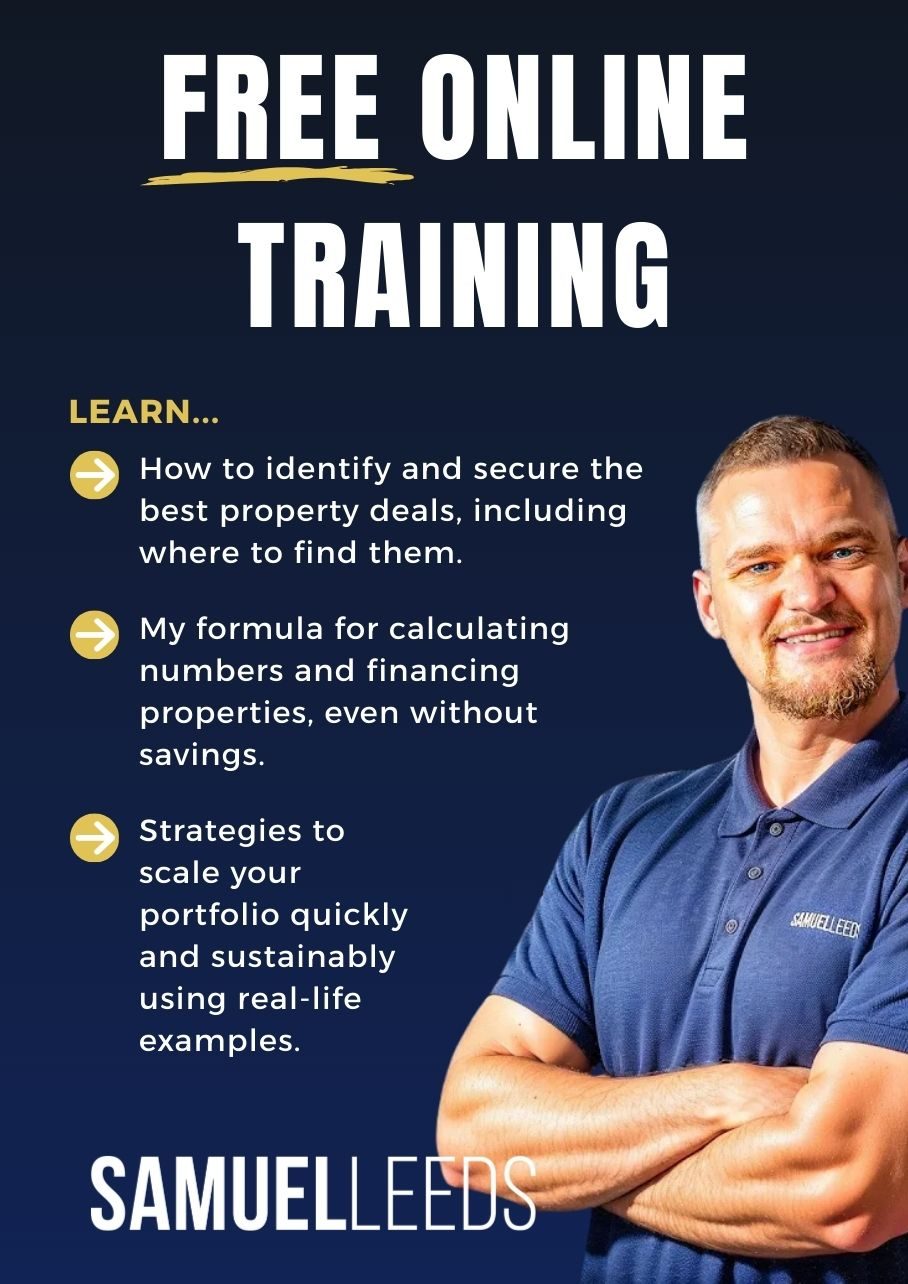Royal Navy catering manager Tim Frederick has built a real estate portfolio which has tripled in size since he joined Samuel Leeds’ academy in 2022. It has also made him a property millionaire. He rents out a mixture of accommodation, giving him a passive income while he is away at sea.
‘I didn’t know you could use other people’s money to invest in property’
Tim performs an essential role within the Navy, making sure he and his team keep the sailors on board his ship well fed during exercises overseas.
Originally from the island of Saint Vincent, he emigrated to the UK in 2007 to become a member of the armed forces. Aged just 16 at the time, he was one of five boys adopted by a woman from Britain who spent her holidays in the Caribbean.
“She offered me housing and residency to come over and join the forces and so I took the opportunity,” he explains.
It was a big step to take but Tim has never looked back since. He is grateful to his ‘UK mum’ for helping him.
It was through her that he got involved in property investing. “In 2016, before my UK mum passed away her words to me were, ‘Tim you need to get onto the property ladder. This is your time, and you need to do it now.”
Tim needed no further encouragement. Straight away he seized the initiative and went property hunting on his weekends off with a friend. Within months he made his first acquisition.
“I bought my first home in Manchester in May 2016. I bought it for £156,995 And then I sold it in 2023 for £265,000. While I was away on deployment during Covid, in 2021, I was in Japan and then I bought my second home. And during Covid in 2020 I invested in a property with a friend as well.”
Every time the catering manager was deployed he was ‘saving, saving, saving,’ as he describes it, to invest in bricks and mortar.
“The Navy was a stepping stone for me, and I used the benefits to develop my own property portfolio.”
After being at sea in 2021 for almost ten months, and then being ‘alongside’ the following year, Tim wanted to have some work on the side to keep him busy. So, he started using YouTube to find out more about property investing.
It was then that he saw a clip about Samuel Leeds’ book, Buy Low Rent High. After reading it, he watched Samuel’s videos and then enrolled on his £1 crash course.
Tim recalls how he drove from Plymouth to Birmingham in the early hours of the morning to attend the weekend course. The main message that he took away was that rather than using his own funds, he could tap into the resources of investors.
“I kept on saving and saving and I didn’t know you could use other people’s money.”
Tim learnt that there were many ways to fund a property investment and different strategies he could employ. He could use credit cards, for example, or angel investors. He also understood that by building his brand, putting himself out there and being in the right circle ‘anything is possible.’
‘When I joined the academy, my thermostat was reset’
After coming along to the crash course, Tim signed up to Samuel Leeds’ property investors’ academy and made rapid progress, trebling his assets in the space of just two years. He now has six properties, and rents out serviced accommodation as well.
“I’ve found my rent-to-serviced accommodation myself on top of the six I own, and then I invested in them and went into BRR (buy, refurbish, refinance) because I wanted to diversify my wealth.”
He bought BRR deals and ‘cracked on from there,’ raising finance along the way for his ventures.
His first two houses were making a net profit of about £700 per month, he says. These days his financial thermostat is raised somewhat higher.
“Joining the academy was a good decision. It changed my mindset. I remember one time Samuel said you need to reset your thermostat. Your thermostat is not burning brightly. From that day when I joined the academy my thermostat was reset.”
Tim focuses on finding rundown properties which he can renovate and then rent out. This not only gives him an ongoing income, but it also enables him to recycle his cash. Once he has refurbished a house, he can remortgage it to its new value, pulling out capital to reinvest in another project. Then he can repeat the process.
When assessing a deal, the entrepreneur looks at how much money needs to be put in to make it a viable proposition. In his calculations, he includes the cost of the refurbishment, the mortgage payments, stamp duty and legal and indemnity fees. He also has a contingency plan.
Once he has an idea of how much the property will be worth when done up, he researches the rental value. That gives an indication of whether there is a ‘decent profit’ in it for him.
He uses that information to pitch a deal to investors when trying to raise finance. “For one of my deals I raised £25,000. I’m giving them a fixed return and then pay them back on the refinance.”
Tim pulled off his ‘best deal’ when he used his own money to buy a two-bed property in Durham for just £70,000. He spent £7,000 on doing it up and then changed it into a four-bed, pushing up the value.
The full amount invested was about £30,000. After taking out a new mortgage, it had effectively only cost him £25,000. The cherry on the cake was clinching a five-year social housing contract. The rent he receives from it gives him a passive income and the returns are high.
Tim used the revenue to purchase another property for £78,000. After spending £24,000 on the renovation, he refinanced it at £115,000, pulling out most of his money. He left £5,000 in and is renting it out as an Airbnb.
Having an income that covers your bills is a key goal for any property investor. In Tim’s case it also suits his lifestyle, given the demands of his job in the Navy. He can be called on at a moment’s notice and is frequently away for long periods.
He uses his spare time at weekends and any leave he gets to carry out refurbishments.
“Over my annual leave period I’m always looking for properties to continue to grow my wealth.”
His last deal was buying his home in Doncaster. It was on the market for £290,000 and he paid £245,000 for it.
Agents manage his properties which means he has no work to do. His portfolio is also systemised.
‘I could retire if I wanted to’
Buying properties comes with challenges. It can be tiring and problematic. The biggest challenge Tim faced was establishing a line of communication between himself and contractors and finding time to run his business.
“Time is of the essence. Doing properties on the side you’ve got to be able to have that time management down to a tee.”
The Navy man is due to leave the country in the next few weeks to go on an exercise for six months. Despite that, he will still be concentrating on his property developing.
“It’s a long time but that’s where the mission comes into play whereby you can reset and have a goal.”
With the type of work he does, having his power team around him is hugely important. “They understand my job role and I understand them. I can always call them at any time, and they will give me the support.”
The whole environment of the academy and being around like-minded people gave him inspiration.
“Everyone is speaking about property, how they can develop themselves, how to use the Swot analysis and going to the dinners.”
As well as learning how to identify strengths, weaknesses, opportunities and threats, Tim also took part in a two-day Accelerated Coaching Performance Programme. This is an intensive training session during which Samuel grills his students about their plans and offers advice.
Each person is given a bespoke action plan after being put in the ‘hot seat’ and questioned about what they have been doing and being told what is expected of them.
“Everyone’s journey is different. You learn different ideas. It’s just totally rewarding,” enthuses Tim.
If he wanted to, his earnings from property would be enough to allow him to retire or leave the military, he says, but for the moment he is content to stay in the forces.
“It feels great (to have a £1m portfolio), but there’s a hunger for more. I’m looking forward to doing larger developments.”
Tim is also keen to spread the word about his property activities and to show others serving in the forces how they can benefit from investing in bricks and mortar.
“My mission over the next year is to continue to develop myself through property, building my credibility through property and to show each and everyone that if you’ve got a plan make sure you go ahead with that mission and get it done.”
He believes other people in the military should consider investing in property to give themselves a secondary income. “I’ll always say to them think of different ways to diversify your wealth. Don’t just think about the long-term goal which is a pension. Think about what could be done today and have a short, medium and long-term plan.”
Tim’s tips
- You’ve got to be able to take action to succeed in property.
- You need to have the kind of mentality where you’re thinking of different ways to have a passive income and you’re thinking ahead.
- Use your income wisely to create generational wealth.
Samuel Leeds’ verdict
“What Tim was doing in property before he joined the academy was good, but it was slow. It would take many years to buy six houses just by saving up money for deposits. But Tim managed to do it quite quickly using the creative strategies we teach.
“I’ve seen his houses and it’s incredible what he’s achieved. He is a beacon of light in the academy and has been a massive inspiration to many people. We appreciate everything he does for the community.”





